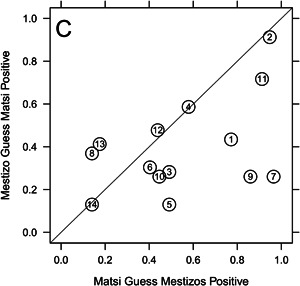- Record: found
- Abstract: found
- Article: found
Field evidence for two paths to cross-cultural competence: implications for cultural dynamics

Read this article at
Abstract
Abstract
Interaction between members of culturally distinct (ethnic) groups is an important driver of the evolutionary dynamics of human culture, yet relevant mechanisms remain underexplored. For example, cultural loss resulting from integration with culturally distinct immigrants or colonial majority populations remains a topic whose political salience exceeds our understanding of mechanisms that may drive or impede it. For such dynamics, one mediating factor is the ability to interact successfully across cultural boundaries (cross-cultural competence). However, measurement difficulties often hinder its investigation. Here, simple field methods in a uniquely suited Amazonian population and Bayesian item–response theory models are used to derive the first experience-level measure of cross-cultural competence, as well as evidence for two developmental paths: cross-cultural competence may emerge as a side effect of adopting out-group cultural norms, or it may be acquired while maintaining in-group norms. Ethnographic evidence suggests that the path taken is a likely consequence of power differences in inter- vs intra-group interaction. The former path, paralleling language extinction, may lead to cultural loss; the latter to cultural sustainability. Recognition of such path-dependent effects is vital to theory of cultural dynamics in humans and perhaps other species, and to effective policy promoting cultural diversity and constructive inter-ethnic interaction.
Related collections
Most cited references68
- Record: found
- Abstract: not found
- Article: not found
On Information and Sufficiency
- Record: found
- Abstract: found
- Article: not found
Multicultural minds. A dynamic constructivist approach to culture and cognition.
- Record: found
- Abstract: not found
- Article: not found
